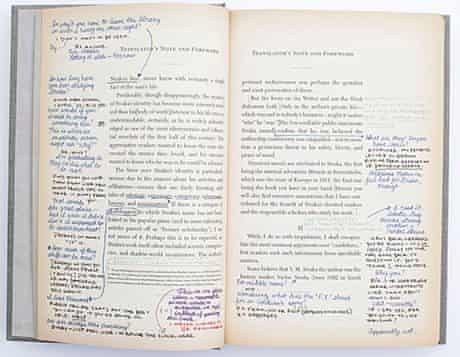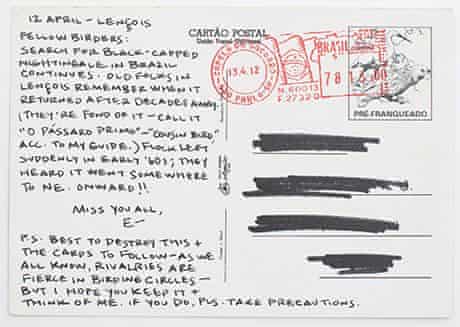Jj Abrams S the Ship of Theseus Review
T he Übergeek. The Boy With All the Toys. The Lord of the Nerds. It might seem equally if the almost pregnant accomplishment of Jeffrey Jacob "JJ" Abrams, screenwriter, actor, producer, manager, composer and author, is to take fabricated fanboy civilisation office of the mainstream. Only the publication of "his" first novel – more on those inverted commas anon – also shows that the avant garde and the experimental are in the ascendant. The fusion of popular culture and continental philosophy – works which are equally au fait with Foucault as with the Flash, Boba Fett and Baudrillard, Kierkegaard and Kirk – are everywhere, from the novels of China Miéville, Michael Chabon and Scarlett Thomas, to the comics work of Grant Morrison and Mike Carey, to Tv shows such as Agents of SHIELD. and The Big Bang Theory. The geeks take inherited the earth.
Abrams was born in New York, in 1966, and raised in Los Angeles, with both his parents working in the manufacture he now bestrides. One shouldn't read too much into this confluence of East Coast intelligentsia and West Coast complimentary-thinking, given that the genuinely meaning event of his childhood was the 1977 release of Star Wars: Episode Iv: A New Hope. I am of an age, roughly, with Abrams, and retrieve obsessing about that Roman numeral. We were already in a story. Things had happened earlier the tale we were being told. When Alec Guinness replied to Marking Hamill'due south question "You lot fought in the clone wars?" "Yep, I was once a Jedi knight, the aforementioned equally your male parent", tens of thousands of kids with spectacles went away thinking, "What were the clone wars?" (When we institute out in 2002, nosotros were mostly disappointed: imagine all those years of imaginative investment reduced to pallid CGI).
At the same fourth dimension, deep in the Scottish Borders, I was watching reruns of Star Trek. Star Wars was "a long time ago, in a galaxy far, far abroad". Star Expedition was an obviously possible future: faster-than-light spaceships, a unified globe government and the capability to transport people by unstitching their molecules and atoms, and then reassembling them, were clearly within our reach. The idea of mobile communication devices, computers that could scan all recorded knowledge and self-opening doors were definitely fantastical and a bit empty-headed.

Abrams is now in charge of both franchises, hence the monikers found on fan sites. He has delivered two Star Trek films and the much-anticipated Star Wars: Episode VII is due erstwhile in 2015. He has both the Enterprise and the Millennium Falcon to play with, and yet has chosen to co-create a novel, Due south, instead. Information technology is non a diversion or a jeu d'camaraderie or a frolic of his ain: S is at the heart of Abrams' aesthetic vision.
Although Abrams worked on a number of cinematic projects – notably Regarding Harry with Star Wars star Harrison Ford, most the nature of identity, and 2 comedies, Gone Fishin' and Taking Care of Business (released as Filofax in the UK) – his breakthrough work was in television receiver and with his own production company, Bad Robot. That show was Allonym, virtually a young woman, Sydney Bristow, who is a triple amanuensis for the CIA. It established a set of Abrams-esque themes: arcing mythologies (in this case, the prophecies and technologies of Milo Rambaldi), a willingness to reboot the series radically at certain junctures, and a canny center on audition expectations. There were hints of these associations in his earlier career. His fascination with end-of-the-world scenarios chimes neatly with working on Armageddon. Moreover, although the Boob tube serial he co-wrote first, Felicity, was primarily a realistic one-act well-nigh a higher educatee, it contained the seeds of ideas that would be fully realised later. Towards the terminate of flavor four, the audience was given alternate timelines and parallel realities. Only before season ii, the eponymous star Keri Russell sent producers a prank photograph of herself with, plainly, her trademark gold locks shorn off. This became integrated into the prove itself, a trick that would exist used well during the filming of Lost.
It does seem, in retrospect, foreign that I spent almost 15% of my life obsessed with Abrams' Tv set series Lost, co-created with Damon Lindelof and Jeffrey Lieber. Every calendar week for six years I would telephone my friend, the novelist Andrew Crumey, to unpick the latest episode. Lost had a simple premise: Oceanic Airlines flying 815 crashes on a desert isle, and some of the passengers have miraculously survived. They discover they are non alone on the island; and a series of flashbacks (then flash-forwards, and wink-sideways) link their lives before and after the crash to an intricate mythology. Lost was telly for the TiVo generation. It teased the viewer with clues and hints that could only be fully interpreted on freeze-frame and had innovative online alternate-reality games. Discussions about the show buzzed on internet bulletin boards, giving the producers invaluable insight into its reception, and fifty-fifty allowing them to misdirect or seed ideas based on the fans' response. If, in the stop, Lost was more than emotionally fulfilling than intellectually satisfying (I nonetheless have a pang of anger whenever I remember they never explained why all the combs disappeared from the luggage), it nevertheless set up a new standard for television drama.
Abrams withdrew from Lost to direct Mission: Impossible 3 and co-created a similar Boob tube show, Fringe, in 2008, with Roberto Orci and Alex Kurtzman. Collaboration seems his preferred mode of product, and this is borne out with the novel S, which Abrams "conceived", but which has been written by Doug Dorst.

A minute-long YouTube trailer, featuring a human being with his mouth stitched close and a voiceover stating "what begins at the water shall end there" and "this is what happens when y'all get lost", was the kickoff hint of S. Online speculation wondered if this was a teaser for a Lost spinoff series, an accommodation of DC comics' Phantom Stranger, or even a cryptic reference to the new Star Wars motion-picture show. Instead, it heralded a book.
S is a "fake artefact", much like the monster movie Cloverfield, which Abrams produced in 2008 and which used constitute footage. Non but do nosotros get a novel, Send of Theseus, purportedly by a "VM Straka" – about a homo shanghaied onto a mysterious gunkhole with a demonic crew – the copy in the reader's mitt is heavily annotated past two other readers, Jennifer and Eric, who are attempting to make sense of the text and themselves, as well as the enigmatic effigy of Straka himself. Interleaved into it are endless pieces of ephemera: postcards, telegrams, a map scribbled on a napkin from the Pronghorn Java coffee shop. It fifty-fifty has a imitation library sticker (813.54 STR 1949). It winks at Vladimir Nabokov's Pale Fire – another book near the role of the reader in creating the story – and is probably the most intricately designed slice of literature since Mark Z Danielewski's two novels, House of Leaves and Only Revolutions.
The ship of Theseus paradox is first recorded in Plutarch's get-go-century Life of Theseus: if every plank of a boat is replaced during its voyage, is it the same vessel that embarked or a different one when it reaches its destination? The novel raises similar questions of identity. How much tin you change before you are different? How much does interpretation change the text?
In his 2008 TED talk, Abrams reminisced nigh ownership a mystery magic box from Lou Tannen's magic store: "I bought this decades agone, merely if you look at this, y'all'll run into it's never been opened. Ever," said Abrams. "Why have I not opened this, and why have I kept it? It represents infinite possibility. It represents hope. It represents potential. What I love about this box – and what I realised I sort of do, in any it is that I exercise – is I find myself drawn to space possibility and that sense of potential. And I realise that mystery is the catalyst for imagination … What are stories besides mystery boxes?"
South, in its elegant slipcase, is the mystery box that can be opened without dispelling its mystery. Information technology is as much of a love alphabetic character to the form every bit Super 8 was a homage to the films of Spielberg. If Abrams brings the aforementioned ingenuity and intensity to Star Wars: Episode VII, and then 2015 might feel like 1977.
S is published tomorrow by Canongate, price £28. To order a copy for £20.99 with free UK p&p become to theguardian.com/bookshop or telephone call 0330 333 6846
Source: https://www.theguardian.com/books/2013/oct/27/jj-abrams-ship-of-theseus
0 Response to "Jj Abrams S the Ship of Theseus Review"
Postar um comentário